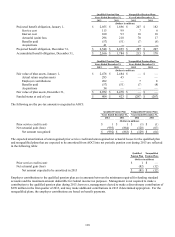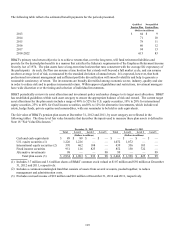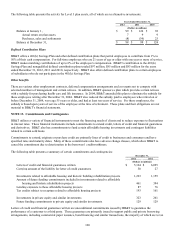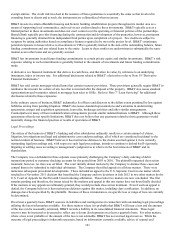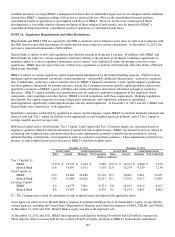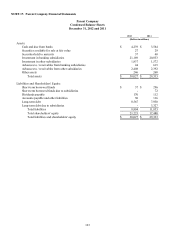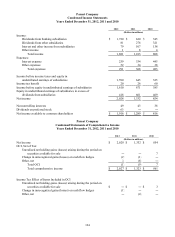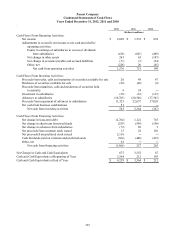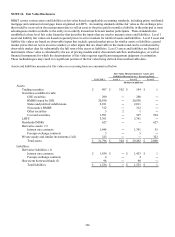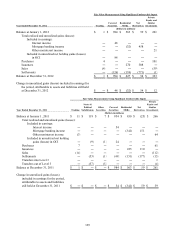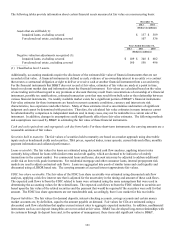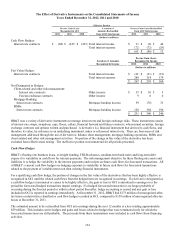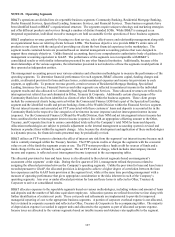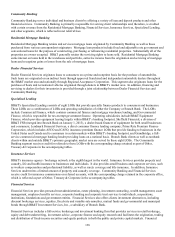BB&T 2012 Annual Report Download - page 150
Download and view the complete annual report
Please find page 150 of the 2012 BB&T annual report below. You can navigate through the pages in the report by either clicking on the pages listed below, or by using the keyword search tool below to find specific information within the annual report.128
Non-agency RMBS: Pricing matrices for these securities are based on observable inputs including offers, bids, reported
trades, dealer quotes and market research reports, the characteristics of a specific tranche, market convention prepayment
speeds and benchmark yield curves as described above.
Other securities: These securities consist primarily of mutual funds and corporate bonds. These securities are valued based
on a review of quoted market prices for assets as well as through the various other inputs discussed previously.
Covered securities: Covered securities are covered by FDIC loss sharing agreements and consist of re-remic non-agency
RMBS, municipal securities and non-agency RMBS. Covered state and political subdivision securities and certain non-
agency RMBS are valued in a manner similar to the approach described above for these asset classes. The re-remic non-
agency RMBS, which are categorized as Level 3, were valued based on broker dealer quotes that reflected certain
unobservable market inputs. Sensitivity to changes in the fair value of covered securities is significantly offset by changes in
BB&T’ s indemnification asset from the FDIC. Subject to certain restrictions, the terms of the loss sharing agreement
associated with these re-remic non-agency RMBS provide that Branch Bank will be reimbursed by the FDIC for 95% of any
and all losses.
LHFS: BB&T originates certain mortgage loans to be sold to investors. These loans are carried at fair value based on
BB&T’ s election of the Fair Value Option. The fair value is primarily based on quoted market prices for securities backed by
similar types of loans. The changes in fair value of these assets are largely driven by changes in interest rates subsequent to
loan funding and changes in the fair value of servicing associated with the mortgage loan held for sale.
Residential MSRs: BB&T estimates the fair value of residential MSRs using an OAS valuation model to project MSR cash
flows over multiple interest rate scenarios, which are then discounted at risk-adjusted rates. The OAS model considers
portfolio characteristics, contractually specified servicing fees, prepayment assumptions, delinquency rates, late charges,
other ancillary revenue, costs to service and other economic factors. Fair value estimates and assumptions are compared to
industry surveys, recent market activity, actual portfolio experience and, when available, other observable market data.
Derivative assets and liabilities: BB&T uses derivatives to manage various financial risks. The fair values of derivative
financial instruments are determined based on quoted market prices, dealer quotes and internal pricing models that are
primarily sensitive to market observable data. The fair values of interest rate lock commitments, which are related to
mortgage loan commitments and are categorized as Level 3, are based on quoted market prices adjusted for commitments that
BB&T does not expect to fund and include the value attributable to the net servicing fees.
Private equity and similar investments: BB&T has private equity and similar investments that are measured at fair value
based on the investment’ s net asset value. In many cases there are no observable market values for these investments and
therefore management must estimate the fair value based on a comparison of the operating performance of the company to
multiples in the marketplace for similar entities. This analysis requires significant judgment and actual values in a sale could
differ materially from those estimated.
Short-term borrowed funds: Short-term borrowed funds represent debt securities sold short. These are entered into through
BB&T’ s brokerage subsidiary. These trades are executed as a hedging strategy for the purposes of supporting institutional
and retail client trading activities.


